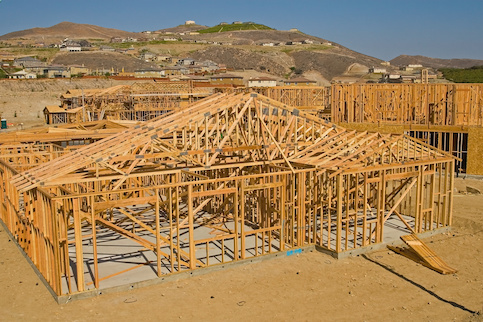Most mortgages in the United States have a repayment term of 30 years, but you can pay off a home loan in less time. Short-term mortgage loans are repaid in 15 years or less. They have a higher monthly payment, but you can own your home free and clear sooner while saving thousands in interest. There are pros and cons to short-term mortgages, so it’s important to know the trade-offs before signing up for one.
Key Takeaways:
- Short-term mortgages mature in 15 years or less, while most mortgages are repaid over a 30-year term.
- The shorter term means you’ll pay less in interest both every month and over time, but the monthly payment will be higher.
- Short-term loans are suitable for home buyers who can afford the high monthly payments and want a quicker road to equity and homeownership.
What Is A Short-Term Mortgage?
A short-term mortgage has a term of 15 years or less. Short-term loans are popular with buyers who want to build equity quickly and own their home sooner, as well as with homeowners who wish to refinance without extending their term.
Because a short-term loan is paid off in less time, lenders typically charge a lower interest rate – up to one percentage point – than for a 30-year mortgage. And since there are fewer payments to make, you’ll pay less overall interest on the loan, ultimately saving you money. The trade-off is that your monthly payment will be higher, which not everyone can afford.
“A short-term mortgage isn’t just a loan – it’s a strategic financial maneuver designed to sprint towards homeownership,” says Greg Clement, Founder and CEO of Realeflow, a real estate investing software company based in Parma Heights, Ohio. “Typically lasting between five to 15 years, it’s crafted for those who aim to pay off their homes quickly and efficiently.”
What’s Your Goal?
Buy A Home
Discover mortgage options that fit your unique financial needs.

Refinance
Refinance your mortgage to have more money for what matters.
Tap Into Equity
Use your home’s equity and unlock cash to achieve your goals.
How Do Short-Term Mortgages Work?
With a short-term mortgage, you’ll make monthly payments toward the principal borrowed, the interest charged by the lender, and other costs like property taxes and homeowners insurance. But because you’re paying off the loan in less time, you’ll pay more each month.
One of the most appealing things about a short-term mortgage is that it saves you money in the long run. Because you’ll pay less interest over the life of the loan, thanks in part to lower interest rates, the overall cost of paying off your home will be less. In contrast, a longer-term mortgage has a lower monthly payment, but you pay more overall interest.
For example, say you’re purchasing a $500,000 home and could afford a 20% down payment. A 30-year fixed-rate mortgage at 7% would cost $2,661 a month, and you’d pay $558,036 in total interest. A 10-year short-term mortgage for the same amount at 6% would have a monthly payment of $4,441 and total interest of $132,898. The short-term option would cost $1,780 more per month, but 20 additional years of the lower payment means you pay $425,138 more in interest – more than three times as much – with the longer term.
Ready To Become A Homeowner?
Get matched with a lender that can help you find the right mortgage.
How Do I Qualify For A Short-Term Mortgage?
To qualify for a short-term mortgage, lenders generally have the same requirements as they would for any mortgage:
- Proof of income
- Credit score
- Debt-to-income ratio
- List of assets
- Savings
Because the monthly payment for a shorter-term mortgage is higher, lenders typically have stricter requirements to ensure you can afford the payments.
You also need money for the down payment and closing costs. On a conventional loan, the minimum down payment is 3% of the purchase price. A down payment of 20% or more will allow you to avoid paying for private mortgage insurance.
Take The First Step To Buying A Home
Find a lender that will work with your unique financial situation.
What Are The Pros And Cons Of Short-Term Mortgages?
Many aspects of short-term mortgages may be appealing, but there are potential downsides.
Pros
Benefits of a short-term mortgage include:
- Lower interest rates. Short-term mortgage rates typically are lower than interest rates for a 30-year loan. “The lower interest rates and shorter term means that, over the mortgage term, you pay less in interest, which is a major bonus – plus you get full ownership of the property sooner,” says Seamus Nally, CEO of TurboTenant, a company based in Fort Collins, Colorado, that makes property management software.
- You pay less interest. Between lower interest rates and fewer overall payments, the total interest you pay with short-term mortgage loans can be substantially lower than with a longer mortgage.
- You build equity faster. Lower interest rates and higher monthly payments mean you’re paying more toward your principal every month, which helps you build equity rapidly. “For example, the amount of equity you build in five years with a 15-year loan will be much greater than what you would accumulate in a 30-year mortgage,” says Eric Croak, a Certified Financial Planner and President of Croak Capital in Toledo, Ohio. Equity translates into profit when you sell your home, or you can borrow it to pay for major expenses with a home equity loan, line of credit or cash-out refinance.
- You own your home sooner. A shorter mortgage term lets you pay off your loan and own your home free and clear more quickly. Paying off your mortgage frees up cash in your budget for other expenses, such as retirement savings or paying education expenses.
Cons
Potentially negative consequences of short-term mortgages include:
- A higher monthly payment. The higher monthly payment that comes with a short-term mortgage may be unaffordable if you’re on a budget. Even if you can afford it, it reduces the cash available for other expenses. It also limits your financial flexibility should your expenses climb or your income unexpectedly drops.
- It may limit how much you can borrow. Your budget may not adequately accommodate the higher monthly payment on a short-term mortgage for lenders to approve a loan large enough for you to afford the home you want.
- Fewer lenders offer short-term mortgages. A 30-year fixed-rate conventional mortgage is the most popular home loan in the U.S., so shorter-term mortgages are more of a niche product. You’ll have fewer options when shopping for short-term mortgage lenders, possibly because their return on investment for these loans is lower, as they make less money in interest overall.
Alternatives To Short-Term Mortgages
If you can’t afford the monthly payment on a short-term mortgage, here are some other options for buying a home.
Adjustable-Rate Mortgages
Adjustable-rate mortgages are home loans whose interest rate changes over time. They usually start with a lower rate that’s locked in for a specific time, then adjust it depending on market conditions. Buyers can use an ARM like a short-term mortgage should they plan to sell the home before the introductory rate expires. That allows them to save on interest while they own the home and sell the home before it can increase.
Interest-Only Mortgages
Interest-only mortgages are the opposite of short-term mortgages, in which monthly payments are high and you build equity quickly. Payments on an interest-only mortgage are not applied to the principal for the first several years of the loan, reducing the monthly payment. You won’t earn equity in those years unless the value of your home increases. And if your home loses value, you could end up with negative equity, where you owe more than your home is worth. Buyers who plan on owning a home for a short period or converting it into an investment property often use these loans.
Bridge Loans
Bridge loans are meant to provide short-term cash between two points. “As the name implies, these loans are meant to ‘bridge’ the financial gap between purchasing a new property and selling your previous one,” says Croak. These loans typically have terms of six months to a year. They usually have higher interest rates than conventional loans.
Balloon Loans
Balloon loan payments are amortized so that the entire balance is not paid at the end of the payment schedule. That unpaid amount then must be paid in a lump sum. This allows you to reduce the monthly payment, but you’ll need to be able to make the balloon payment or risk defaulting on the loan. Balloon loans are popular with buyers planning to live in a house for a short time or flip a property because their profits from selling the home should allow them to avoid the balloon payment.
FAQ
Here are answers to common questions about short-term mortgages.
The Bottom Line
Short-term mortgages are a fast path to owning your home. They also can save you thousands in interest and quickly build equity. However, they also come with higher monthly payments that home buyers need to be sure they can afford before choosing this loan option.
More from Quicken Loans:
- Mortgage Comparison: 15- Vs. 30-Year Mortgage
- What Are Mortgage Rates And How Are They Determined?
- Fully Amortized Loan: What It Is And How It Impacts Your Payments
- What Exactly Is A Loan Term And What Does It Mean?
- Types Of Home Loans: A Guide For Buying Or Refinancing Your Home
- How Mortgage Rates Are Determined: A Quick Guide
- Types Of Refinance: Choosing The Best Option For You

Gillian Glover
Gillian Glover is a Senior Editor at Quicken Loans. She's a Los Angeles native with more than a decade of experience creating, shaping and perfecting content for publications including the Los Angeles Times, The Hollywood Reporter and Time Out Los Angeles.












